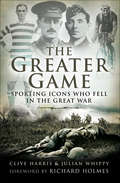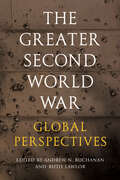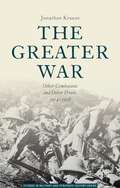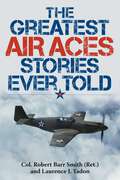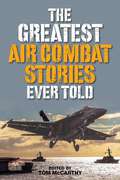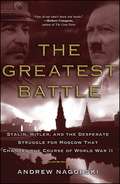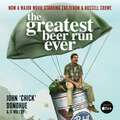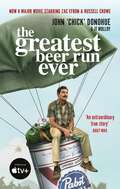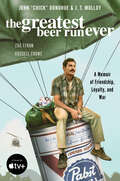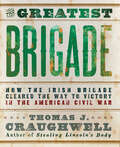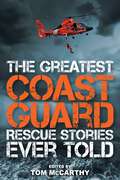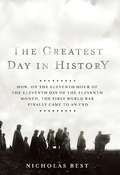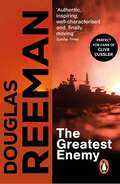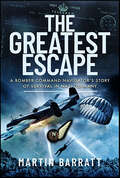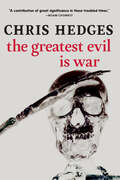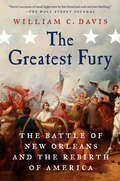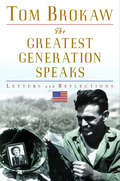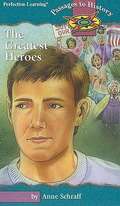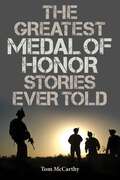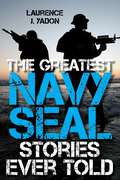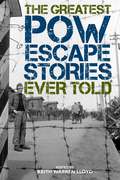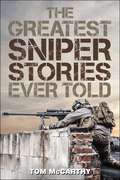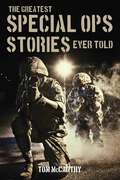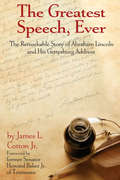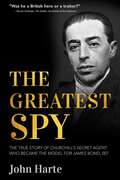- Table View
- List View
The Greater Game: Sporting Icons Who Fell in the Great War
by Clive Harris Julian WhippyFrom the athletic fields to the fields of battle—these great sportsmen gave their all and sacrificed their lives for their countries in World War I. As the First World War swept across Europe, millions of eager and idealistic volunteers lined up to serve in what was to be the War to End All Wars. All were expected to do their duty—and those rare men who were idolized as the greatest athletes of their time were bound and determined to keep up their end. But no one could have foreseen the true horrors of war that awaited them all . . . This fascinating book examines the deadly impact of the Great War on a number of leading professional sportsmen of the age. Their untimely deaths underscored how even the fittest and most gifted were as vulnerable as any normal soldier—and their loss was felt by far more than their families and friends. Among those featured in this illustrated book are such luminaries as Donald Bell, the only professional football player to win the Victoria Cross; Anthony Wilder, the glamorous Wimbledon champion who fell in May 1915; Francois Faber, the Tour de France star; Percy Poulton Palmer, the England Rugby Captain; and many others. Here, the authors explore the effect that famous athletes have on their countrymen and fellow soldiers in a time of war, and the devastating consequences that World War I had on the emerging world of professional sports.
The Greater Second World War: Global Perspectives
by Andrew N. Buchanan Ruth LawlorThe Greater Second World War challenges the traditional temporal and geographic frameworks of World War II, expanding the timeline to include a series of regional conflicts and revolutions that began in 1931 and continued into the mid-1950s. These conflicts bookended a "central paroxysm" defined by the intervention of the United States into every theater of the war, rendering it genuinely global. The essays within this volume bring top-level accounts of US, European, and Axis strategic maneuvering into conversation with social histories of "bottom-up" agency in ways that destabilize conventional narratives.Working with novel and overlapping scales of time and space and attuned to ongoing and lively debates about the place of the nation-state in global history after 1945, the scholars featured in The Greater Second World War seek to not only describe the war's beginnings in Asia and Africa—rather than in Europe—but also trace its ends to the shatter zones of the Soviet frontier, the struggles for sovereignty in contested spaces, and the long-reaches of US imperialism well into the late twentieth century. Together, their contributions reveal how the cascading imperial and economic crises of the mid-twentieth century triggered a series of discrete local and regional struggles that took on the character of a singular, unified "world war" after the entry of the United States into every theater and almost every corner of the world.Contributors: Marco Maria Aterrano, Th. W. Bottelier, Pablo del Hierro, Alexandre Fortes, Kelly A. Hammond, Ashley Jackson, Naina Manjrekar, David Motadel, Tejasvi Nagaraja, Martin Thomas
The Greater War
by Jonathan KrauseThe Greater War is an international history of the First World War. Comprising of thirteen chapters this collection of essays covers new aspects of the French, German, Italian and American efforts in the First World War, as well as aspects of Britain's colonial campaigns.
The Greatest Air Aces Stories Ever Told (Greatest)
by Laurence J. Yadon Col. Robert Barr SmithIn thirty-five chapters, The Greatest Air Aces Stories Ever Told covers many of the leading American and British Commonwealth fighter aces of WW I and II, together with a few bomber crews whose gallantry made a substantial contribution to the end of WW II. Other nations had their aces, but this book concentrates on American and Commonwealth pilots. These aviators were chosen not only because of their &“scores&” and their great courage, but also for other qualities which set them apart, like the WWII Royal Air Force Wing Commander who shot down more than 20 Germans while flying with two artificial legs. Here are a few of the aces. Note that the air forces of Europe and the United States did not always have today&’s names, used here for simplicity&’s sake:Albert Ball, RAF, son of the Lord Mayor of Nottingham, winner of the Victoria Cross. He had 44 victories in WWI when he was killed at the age of 20, well known to his German foes, whomuch admired him. Gabby Gabreski, USAF. Son of hard-working Polish immigrants. An ace in WWII with 28 kills and later in Korea, with another six. He was an accomplished commander, finished a long career as a colonel. Mick Mannock, RAF. Tough and aggressive in spite of his fear of fire, he won not only the Victoria Cross, but five other high awards for gallantry. Highest British scorer of WWI with 73 victories, he detested Germans, and rejoiced with every kill. He was shot down by ground fire in the last year of the war. David McCampbell, USN. Scored 34 WWII kills to become the U.S. Navy&’s all-time ace. In 1944, set an all-time record with nine victories on a single mission. Winner of the Congressional Medal.Pick Pickard, RAF. Led the RAF rooftop bomber raid on Amiens Prison In WWII, freeing many underground members, some of whom were facing death, and who were promptly spirited away by French partisans. Frank Luke, USAF. Deadly American famous for his busting of German observation balloons in WWI. Shot up over German territory, he managed to land safely, but, being Luke, tried to fight it out with enemy infantrymen with only his pistol. The book will also touch on the equipment these aces flew, from the famous Fokkers and Sopwith Camels to the ungainly two-seater FE2b, which was driven by a pusher engine and looked like a bathtub with wings and a miniature oil derrick glued on the back. Also included are our own Grumman carrier fighters, the P-40s, the P-38s, as well as the P-51 Mustang, probably the finest fighter of the war, a happy marriage of an American airframe and a British engine. The deadly, graceful Spitfire has its place, as do the Hurricane, the biplane Gladiator, and even the four-engine Lancaster.
The Greatest Air Combat Stories Ever Told (Greatest)
by Tom McCarthyHeroism and valor in the sky! * A new title in the relaunch of our successful Greatest Stories Ever Told franchise.* Air combat has captured the imaginations of people since the fighter plane was first introduced during WWI. * Stories of aces such as Eddy Rickenbacker and Captain Baron Manfred Von Richthofen have become staples of books and movies as well as the stuff of legend.In The Greatest Air Combat Stories Ever Told, the editor has pulled together some of the finest tales of heroism and valor in the skies over the battlefield! It is an unforgettable collection, and includes stories by Baron Manfred Von Richthofen, Len Deighton, Jay A. Stout, and many others. It includes tales of legendary aces from the Great War up through the present day, and is the newest title in the series that includes:*The Greatest Special Ops Stories Ever Told*The Greatest Sniper Stories Ever Told*The Greatest Air Aces Stories Ever Told*The Greatest Coast Guard Rescue Stories Ever Told
The Greatest Battle
by Andrew NagorskiThe battle for Moscow was the biggest battle of World War II -- the biggest battle of all time. And yet it is far less known than Stalingrad, which involved about half the number of troops. From the time Hitler launched his assault on Moscow on September 30, 1941, to April 20, 1942, seven million troops were engaged in this titanic struggle. The combined losses of both sides -- those killed, taken prisoner or severely wounded -- were 2.5 million, of which nearly 2 million were on the Soviet side. But the Soviet capital narrowly survived, and for the first time the German Blitzkrieg ended in failure. This shattered Hitler's dream of a swift victory over the Soviet Union and radically changed the course of the war. The full story of this epic battle has never been told because it undermines the sanitized Soviet accounts of the war, which portray Stalin as a military genius and his people as heroically united against the German invader. Stalin's blunders, incompetence and brutality made it possible for German troops to approach the outskirts of Moscow. This triggered panic in the city -- with looting, strikes and outbreaks of previously unimaginable violence. About half the city's population fled. But Hitler's blunders would soon loom even larger: sending his troops to attack the Soviet Union without winter uniforms, insisting on an immediate German reign of terror and refusing to heed his generals' pleas that he allow them to attack Moscow as quickly as possible. In the end, Hitler's mistakes trumped Stalin's mistakes. Drawing on recently declassified documents from Soviet archives, including files of the dreaded NKVD; on accounts of survivors and of children of top Soviet military and government officials; and on reports of Western diplomats and correspondents, The Greatest Battle finally illuminates the full story of a clash between two systems based on sheer terror and relentless slaughter. Even as Moscow's fate hung in the balance, the United States and Britain were discovering how wily a partner Stalin would turn out to be in the fight against Hitler -- and how eager he was to push his demands for a postwar empire in Eastern Europe. In addition to chronicling the bloodshed, Andrew Nagorski takes the reader behind the scenes of the early negotiations between Hitler and Stalin, and then between Stalin, Roosevelt and Churchill. This is a remarkable addition to the history of World War II.
The Greatest Beer Run Ever: A Crazy Adventure in a Crazy War *NOW A MAJOR MOVIE*
by J. T. Molloy John 'Chick' Donohue***NOW A MAJOR MOVIE STARRING ZAC EFRON, RUSSELL CROWE AND BILL MURRAY THE NEW YORK TIMES BESTSELLER 'An extraordinary story.' - Daily Mail'An unforgettable, wild ride from start to finish.' - John Bruning'The astounding true story - from the streets of Manhattan to the jungles of Vietnam.' - Thomas KellyIT SEEMED LIKE A GOOD IDEA AT THE TIME.As a result of a rowdy night in his local New York bar, ex-Marine and merchant seaman "Chick" Donohue volunteers for a legendary mission. He will sneak into Vietnam to track down his buddies in combat to bring them a cold beer and supportive messages from home. It'll be the greatest beer run ever!Now, decades on from 1968, this is the remarkable true story of how he actually did it.Armed with Irish luck and a backpack full of alcohol, Chick works his passage to Vietnam, lands in Qui Nhon and begins to carry out his quest, tracking down the disbelieving soldiers one by one.But things quickly go awry, and as he talks his way through checkpoints and unwittingly into dangerous situations, Chick sees a lot more of the war than he ever planned - spending a terrifying time in the Demilitarized Zone, and getting caught up in Saigon during the Tet Offensive.With indomitable spirit, Chick survives on his wits, but what he finds in Vietnam comes as a shock. By the end of his epic adventure, battered and exhausted, Chick finds himself questioning why his friends were ever led into the war in the first place.
The Greatest Beer Run Ever: A Crazy Adventure in a Crazy War *NOW A MAJOR MOVIE*
by J. T. Molloy John 'Chick' Donohue***NOW A MAJOR MOVIE STARRING ZAC EFRON, RUSSELL CROWE AND BILL MURRAY THE NEW YORK TIMES BESTSELLER 'An extraordinary story.' - Daily Mail'An unforgettable, wild ride from start to finish.' - John Bruning'The astounding true story - from the streets of Manhattan to the jungles of Vietnam.' - Thomas KellyIT SEEMED LIKE A GOOD IDEA AT THE TIME.As a result of a rowdy night in his local New York bar, ex-Marine and merchant seaman "Chick" Donohue volunteers for a legendary mission. He will sneak into Vietnam to track down his buddies in combat to bring them a cold beer and supportive messages from home. It'll be the greatest beer run ever!Now, decades on from 1968, this is the remarkable true story of how he actually did it.Armed with Irish luck and a backpack full of alcohol, Chick works his passage to Vietnam, lands in Qui Nhon and begins to carry out his quest, tracking down the disbelieving soldiers one by one.But things quickly go awry, and as he talks his way through checkpoints and unwittingly into dangerous situations, Chick sees a lot more of the war than he ever planned - spending a terrifying time in the Demilitarized Zone, and getting caught up in Saigon during the Tet Offensive.With indomitable spirit, Chick survives on his wits, but what he finds in Vietnam comes as a shock. By the end of his epic adventure, battered and exhausted, Chick finds himself questioning why his friends were ever led into the war in the first place.
The Greatest Beer Run Ever: A Memoir of Friendship, Loyalty, and War
by John "Chick" Donohue J. T. Molloy“Chickie takes us thousands of miles on a hilarious quest laced with sorrow, but never dull. You will laugh and cry, but you will not be sorry that you read this rollicking story.”—Malachy McCourtSoon to be a major motion picture written and directed by Peter Farrelly, who won two Academy Awards for Green Book—a wildly entertaining, feel-good memoir of an Irish-American New Yorker and former U.S. marine who embarked on a courageous, hare-brained scheme to deliver beer to his pals serving Vietnam in the late 1960s.One night in 1967, twenty-six-year-old John Donohue—known as Chick—was out with friends, drinking in a New York City bar. The friends gathered there had lost loved ones in Vietnam. Now, they watched as anti-war protesters turned on the troops themselves. One neighborhood patriot came up with an inspired—some would call it insane—idea. Someone should sneak into Vietnam, track down their buddies there, give them messages of support from back home, and share a few laughs over a can of beer. It would be the Greatest Beer Run Ever. But who’d be crazy enough to do it? One man was up for the challenge—a U. S. Marine Corps veteran turned merchant mariner who wasn’t about to desert his buddies on the front lines when they needed him. Chick volunteered. A day later, he was on a cargo ship headed to Vietnam, armed with Irish luck and a backpack full of alcohol. Landing in Qui Nho’n, Chick set off on an adventure that would change his life forever—an odyssey that took him through a series of hilarious escapades and harrowing close calls, including the Tet Offensive. But none of that mattered if he could bring some cheer to his pals and show them how much the folks back home appreciated them.This is the story of that epic beer run, told in Chick’s own words and those of the men he visited in Vietnam.
The Greatest Brigade: How the Irish Brigade Cleared the Way to Victory in the American Civil War
by Thomas J. CraughwellA history of the impressive, predominantly Irish American brigade of the Union Army and their role in its victory over the Confederacy.Faugh a Ballagh! Clear the Way!This is the story of a band of heroes that covered the Yankee retreat at Bull Run, drove the Confederates from the Sunken Road at Antietam, and made charge after charge up Marye’s Heights at Fredericksburg. The gallantry of the Irish Brigade won them the admiration of the high command of both North and South, earned them seven Medals of Honor, and after the war, went a long way to helping the Irish assimilate into the American mainstream.Shouting their Gaelic battle cry, the men of the Irish Brigade charged across the bloodiest battlefields of the Civil War and into the realm of legend. The Greatest Brigade is a grand narrative history of these Irishmen who fought in every major battle in the Eastern Theater of the Civil War, including Bull Run, Antietam, Fredericksburg, Gettysburg, the Wilderness, and Appomattox.Praise for The Greatest Brigade“An exciting journey through the major battles of the Civil War alongside the members of the famed Irish Brigade. Well researched, compellingly written, filled with fascinating illustrations, and with a story that holds the reader with a “bulldog grip,” Thomas Craughwell has written a regimental history that deserves to be on every Civil War lover’s bookshelf.” —Jason Emerson, author of The Madness of Mary Lincoln and Lincoln the Inventor“This engrossing book will appeal both to Civil War buffs and to those interested in the Irish American experience.” —Library Journal“A paean to the Irish immigrants who fought for their adopted homeland. . . . This spirited hagiography marches through the battles fought by the Army of the Potomac’s justly renowned Irish Brigade at quickstep pace. Each chapter reads like an episode of a History Channel documentary.” —Historynet
The Greatest Coast Guard Rescue Stories Ever Told (Greatest)
by Tom McCarthyExciting rescue stories on the high seas! The Coast Guard&’s rescue personnel are second to none, and Coast Guard air and sea rescue missions have been the subjects of celebrated newspaper accounts, books, and movies, including The Perfect Storm. The Coast Guard is one of the nation's five military services, which exist to defend and preserve the United States. In The Greatest Coast Guard Rescue Stories Ever Told, the editor has pulled together some of the finest writings about air and sea rescues that capture readers imaginations, culled from books, magazines, and elsewhere. It is an unforgettable collection, and includes stories by Kathryn Miles, Eric Hartlep, Gerald Hoover, Martha Laguardia-Kotite, Geoffrey D. Reynolds, Kalee Thompson, H. Paul Jeffers, and many others.
The Greatest Day in History: How, on the Eleventh Hour of the Eleventh Day of the Eleventh Month, the First World War Finally Cam
by Nicholas BestUnlike 1945, the First World War did not end neatly with the unconditional surrender of the Germans. After a dramatic week of negotiations, military offensives and the beginning of a Communist revolution, the German Imperial regime collapsed. The Allies eventually granted an armistice to a new German government, and at eleventh hour on the 11th of November, the guns officially ceased fire, but only after 11,000 casualties had been sustained?almost as many as on D-Day. Nicholas Best tells the story in sweeping, cinematic style, revealing that events were far from pre-ordained. From the generalsOCO headquarters to the frontline trenches, from the factories to the farms, he reveals the twists and turns that led to the end of the Great War.
The Greatest Enemy: an all-guns-blazing tale of naval warfare from Douglas Reeman, the all-time bestselling master storyteller of the sea
by Douglas ReemanThis compelling nautical adventure from multi-million copy bestselling author Douglas Reeman will have readers of Clive Cussler, Bernard Cornwell and Wilbur Smith gripped with its expertly combined characterisation and vivid battle scenes. You'll feel like you are on the bridge yourself...!'One of our foremost writers of naval fiction' -- Sunday Times'I could not put it down. I enjoyed every single page of this seafaring tale.' -- ***** Reader review'Enthralling - just had to keep reading to the end' -- ***** Reader review'A cracking read' -- ***** Reader review'Exceptional' -- ***** Reader review'Nail biting to the end' -- ***** Reader review****************************************************************************Twenty-five years ago, HMS Terrapin was part of a crack hunter-killer group in the Battle of the Atlantic. Now she is working out her last commission in the Gulf of Thailand.To Lieutenant-Commander Standish, the frigate seems to mark the end of his hopes of a career in the Navy. Then a new captain arrives, a man driven by an old-fashioned, almost obsessive patriotism. And under his stubborn leadership, Standish and the crew discover a long-forgotten unity of purpose...She was one of the deadliest ships of the war. Her greatest heroics may still lie ahead.
The Greatest Escape: A Bomber Command Navigator’s Story of Survival in Nazi Germany
by Martin BarrattThis is the story of a wartime bomber, its crew and of a tantalizing detective story unfolding over nearly a quarter of a century of intensive research. It is also a story of courage, fortitude and endurance and of one man’s will to survive against seemingly insurmountable odds. Bomber Command’s horrific loss rate during the Second World War cannot be underestimated. Of the 120,000 young aircrew who served, 55,373 were to perish, most of them losing their lives over the night skies of Europe. The Battle of the Ruhr, the campaign to destroy the industrial heartland of Germany which raged between March and July 1943, was both savage in intensity and costly in terms of aircrew. Prospects for survival for anyone involved in operational flying with Bomber Command at that time were particularly bleak. Young aircrew could expect a lifespan measured in terms of weeks where seemingly only a fiery death in an exploding aircraft or captivity as a Prisoner of War awaited. It is with this period that the book is primarily concerned and, more specifically, with the crew of Halifax JB869 of 102 Squadron, of which the author’s father was the navigator, and its loss on the night of 4 May 1943. He survived baling out and, later, an attempted lynching on the ground to become a Prisoner of War. But his escape from his shattered aircraft was only the first of many episodes in his two and a half years of captivity that would see him pushed to the limits of endurance and face death more than once. Like so many veterans the author’s father chose not to speak about his wartime experiences until quite late in his life and it was only after his death and the chance discovery of an archive of letters, logbooks, accounts and other material that the full story of his incredible series of escapes came to light. Through extensive research, including face-to-face interviews and correspondence with a significant number of ex-aircrew, the author has painstakingly pieced together the complete story of the crew of this aircraft, identifying and contacting relatives of each crew member and, for some, bringing closure after decades of not knowing how (or in some cases where) their loved one had met their deaths.
The Greatest Evil is War
by Chris HedgesAn unflinching indictment of the horror and obscenity of war by one of our finest war correspondents.Drawn from experience and interviews by Pulitzer-prize-winner Chris Hedges, this book looks at the hidden costs of war, what it does to individuals, families, communities and nations.In fifteen short chapters, Chris Hedges astonishes us with his clear and cogent argument against war, not on philosophical grounds or through moral arguments, but in an irrefutable stream of personal encounters with the victims of war, from veterans and parents to gravely wounded American serviceman who served in the Iraq War, to survivors of the Holocaust, to soldiers in the Falklands War, among others. Hedges reported from Sarajevo, and was in the Balkans to witness the collapse of the Soviet Union. In 2002 he published War Is a Force that Gives Us Meaning, which the Los Angeles Times described as &“the best kind of war journalism… bitterly poetic and ruthlessly philosophical&” and the New York Times called &“a brilliant, thoughtful, timely, and unsettling book.&” In the twenty years since, Hedges has not wanted to write another book on the subject of war—until now, with the outbreak of war in Ukraine. It is important again to be reminded who are the victors of the spoils of war and of other unerring truths, not only in this war but in all modern wars, where civilians are always the main victims, and the tools and methods of war are capable of so much destruction it boggles the mind. This book is an unflinching indictment of the horror and obscenity of war by one of our finest war correspondents.
The Greatest Fury: The Battle of New Orleans and the Rebirth of America
by William C DavisFrom master historian William C. Davis, the definitive story of the Battle of New Orleans, the fight that decided the ultimate fate not only of the War of 1812 but the future course of the fledgling American republic. It was a battle most thought could not be won. Outnumbered farmers, merchants, backwoodsmen, smugglers, slaves, and Choctaw Indians, many of them unarmed, were up against the cream of the British army, professional soldiers who had defeated the great Napoleon and set Washington, D.C., ablaze. At stake was nothing less than the future of the vast American heartland, from the Gulf Coast to the Great Lakes, as the ragtag American forces fought to hold New Orleans, the gateway of the Mississippi River and an inland empire. Tipping the balance of power in the New World, this single battle irrevocably shifted the young republic's political and cultural center of gravity and kept the British from ever regaining dominance in North America. In this gripping, comprehensive study of the Battle of New Orleans, William C. Davis examines the key players and strategy of King George's Red Coats and Andrew Jackson's makeshift "army." A master historian, he expertly weaves together narratives of personal motivation and geopolitical implications that make this battle one of the most impactful ever fought on American soil.
The Greatest Generation Speaks: Letters and Reflections
by Tom Brokaw"I first began to appreciate fully all we owed the World War II generation while I was covering the fortieth and fiftieth anniversaries of D-Day for NBC News. When I wrote in The Greatest Generation about the men and women who came out of the Depression, who won great victories and made lasting sacrifices in World War II and then returned home to begin building the world we have today--the people I called the Greatest Generation--it was my way of saying thank you. I felt that this tribute was long overdue, but I was not prepared for the avalanche of letters and responses touched off by that book. Members of that generation were, characteristically, grateful for the attention and modest about their own lives as they shared more remarkable stories about their experiences in the Depression and during the war years. Their children and grandchildren were eager to share the lessons and insights they gained from the stories they heard about the lives of a generation now passing on too swiftly. They wanted to say thank you in their own way. I had wanted to write a book about America, and now America was writing back. The letters, many of them written in firm Palmer penmanship on flowered stationery, have given me a much richer understanding not only of those difficult years but also of my own life. They give us new, intensely personal perspectives of a momentous time in our history. They are the voices of a generation that has given so much and wants to share even more. Some of the letters were written from the front during the war, or from families to their loved ones in harm's way in distant places. There were firsthand accounts of battles and poignant reflections on loneliness, exuberant expressions of love and somber accounts of loss. It seems that everyone in that generation has something worthwhile to contribute, and so we have included some pages in The Greatest Generation Speaks for others to share memories at once inspirational and instructive. If we are to heed the past to prepare for the future, we should listen to these quiet voices of a generation that speaks to us of duty and honor, sacrifice and accomplishment. I hope more of their stories will be preserved and cherished as reminders of all that we owe them and all that we can learn from them. --Tom Brokaw.
The Greatest Heroes
by Anne SchraffWhen Ken's efforts to help end the Vietnam War fail, he is forced to decide where his loyalties lie.
The Greatest Medal of Honor Stories Ever Told (Greatest)
by Tom McCarthyIn The Greatest Medal of Honor Stories Ever Told, editor Tom McCarthy has pulled together some of the finest writings about heroes awarded the highest military honor that capture readers imaginations. The one thing the heroes in this collection have in common—from the bloody battlefields of the Civil War through the lonely mountains of Afghanistan—is uncommon valor. Each of the men in these stories had the courage to calmly stare death in the face and move on—to do what they had to because that was their duty and the lives of others meant more to them than their own.Chosen from hundreds of accounts of singular devotion to duty, the stories in Medal of Honor stand out for their jaw-dropping tales of bravery. They are the best. No small feat.
The Greatest Navy SEAL Stories Ever Told (Greatest)
by Laurence J. YadonThe Greatest Navy SEAL Stories Ever Told is the first book to place side by side extraordinary stories of SEALs who put their lives on the line, and then go out and do it again the next day. They illustrate the SEAL maxim, &“The person who will not be defeated cannot be defeated.&”SEALs in action - men of courage and ingenuity, from the rice paddies and hills of Vietnam to the plains and mountains of Afghanistan, Iraq and Pakistan - appear in these pages. These stories cover the most significant overt and covert operations conducted since the U.S. Navy established Sea Land and Air Teams (SEALs) established in January 1962. The one common denominator in these chapters is the courage and ingenuity of those who proudly call themselves Navy SEALs. Sometimes SEALs and other participants in these stories recall differing versions of the same events, as recounted here for the reader to make his own judgments. So far as I know, no previously classified or sensitive information is revealed in these pages.
The Greatest POW Escape Stories Ever Told (Greatest)
by Keith Warren LloydA gripping collection that showcases twelve of the most famous prisoner of war escapes in the history of modern warfare. Although these stories feature escapees of different nationalities, ideologies and allegiances, the reader will be captured by the common traits shared by all of these brave soldiers: loyalty to country and cause, tenacity, resourcefulness, and an abundant amount of courage.
The Greatest Sniper Stories Ever Told (Greatest)
by Tom McCarthyIn The Greatest Sniper Stories Ever Told, editor Tom McCarthy has pulled together some of the finest writings about snipers that capture readers imaginations, meticulously culled from books, magazines, movies, and elsewhere. It is an unforgettable collection, and includes stories by Chris Kyle (author of American Sniper), Joe LeBleu, Gina Cavallaro and Matt Larsen, and many others. It includes tales of legendary snipers from the Revolutionary War up through present-day Afghanistan and Iraq.
The Greatest Special Ops Stories Ever Told (Greatest)
by Tom McCarthyIn The Greatest Special Ops Stories Ever Told, editor Tom McCarthy has pulled together some of the finest writings about Special Operations that capture readers imaginations, meticulously culled from books, magazines, movies, and elsewhere. It is an unforgettable collection, and includes stories by Marcus Luttrell (author of Lone Survivor), Mark Owen (author of No Easy Day; the Firsthand Account of the Mission that Killed Osama Bin Laden), William Morgan, Christian McBurney, James Otis, H. Beam Piper, Duane Schultz, Hampton Sides, Michael Haas, Ben S. Malcolm, and many others. It includes legendary tales from the French and Indian Wars up through present-day Afghanistan and Iraq. We&’ve all read about the killing of Bin Laden and the heroics of Chris Kyle and the SEALs and other special forces teams. Who hasn&’t seen or heard about the extraordinary success of the book and movie American Sniper? But what many people don&’t know is that they follow in a direct line from the earlier and equally lethal efforts of Special Forces in wars throughout our history. Special Operations have been going on since man first started fighting--from the Trojan War (think Trojan horse) to the American Revolution and the Civil War, and from World War II to Korea, Vietnam, Iraq, and Afghanistan. In one place, The Greatest Special Ops Stories Ever Told pulls together all of the greatest tales.
The Greatest Speech, Ever: The Remarkable Story of Abraham Lincoln and His Gettysburg Address
by James H. Cotton Jr.This book was written to be more than a specialized monograph about the Gettysburg Address. The author digressed along the way into side excursions and back roads of Abraham Lincoln's remarkable life - exploring his hardscrabble childhood, and his courageous but controversial Emancipation Proclamation. After all, to fully understand how the Gettysburg Address came to be, one must understand how Abraham Lincoln came to be. Part of the greatness of the Gettysburg Address is that the DNA of Lincoln's life is found in every word. Senator Baker in his Foreword wrote "Judge Cotton's book is not only a fascinating and scholarly assessment of the Gettysburg Address and its impact on America, but also an absorbing look into Abraham Lincoln's life."
The Greatest Spy: The True Story of Churchill's Secret Agent Who Became the Model for James Bond, 007
by John HarteDiscover the life and daring exploits of the real-life model for the world's most famous spy, James Bond: Sidney Reilly! When a twenty-year-old Ukrainian arrived in London as a candidate for the position of secret agent in Britain&’s Secret Intelligence Bureau, the chiefs of what would one day become MI5 were wise to hire him, as he would become Britain&’s greatest spy, a man known by several names. His ingenuity and his mastery of the trade, and his audacity and coolness when in danger, were highly praised. To penetrate the Irish Republican Army (IRA), he was given the code name of Sidney Reilly. He was tasked with kidnapping Lenin and Trotsky during the Russian Revolution, and visited the major battlefronts across Soviet Russia during the civil war, sending back proposals to defeat the Reds. He stole Germany's naval plans from Krupp and the harbor plans in Mongolia for Britain&’s allies, and he posed as a German officer to engage in discussions with the Kaiser and his chiefs of staff about their U-boat tactics against the Allies. He also helped to obtain oil from Persia to modernize Britain&’s Naval Fleet when Churchill was First Lord of the Admiralty. In 1953, novelist Ian Fleming used Reilly&’s secret Admiralty Intelligence file to write his novels about a fictional secret agent he called James Bond 007. But Reilly&’s true exploits were even more thrilling and fantastic than those of the fictional James Bond. Reilly was Britain&’s best spy—but was he also a Soviet double-agent? Author John Harte retells Reilly&’s story as it really was, in fast-moving prose with an eye for telling detail—and provides a twist: He tells us what really happened to Reilly after he vanished in Soviet Russia in 1925 and was assumed to have been murdered by Stalin&’s secret police. Find out what really happened to the man who inspired the creation of the world's most famous spy in The Greatest Spy. But Bond&’s adventures were fantasies, whereas Reilly&’s were real.
